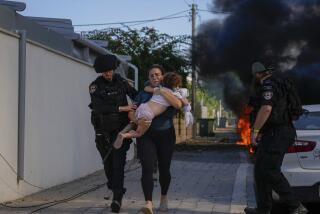First a Sneer, Then a Grenade
- Share via
Secretary of Defense William Cohen, visiting Bosnia this week as part of his first overseas tour, will no doubt hear ample praise of U.S. troops’ role in implementing, as part of a NATO force, military aspects of the peace agreement reached in talks in Dayton, Ohio, two years ago. The warring factions were separated, open warfare ceased and there have been no U.S. combat losses. American forces also successfully resisted being drawn into a wider role of arresting the 68 alleged war criminals, mostly Bosnian Serbs, who were indicted by an international tribunal and who remain impudently, visibly at large.
This restraint was in the name of preventing “mission creep,” the sort of thing that got the U.S. in trouble in Somalia. But perhaps, being fresh on the job, Cohen will question the wisdom of this proposition and see that in Bosnia, the price of inaction is already being paid.
The inability of the NATO troops to face down the authors of genocide and perpetrators of ethnic cleansing discredits the North Atlantic Treaty Organization, which was supposed to be the robust successor to the pussyfooting U.N. force. More precisely, the refusal by the NATO command to order the arrest of indicted war criminals in spite of a mandate and ample resources to do so, is perceived as wimpiness. For the local populations, the international forces’ refusal to proceed with the arrests of indictees is a subject of sneers (regretful among the victims or triumphant among the perpetrators) about a multinational corporation of sissies.
In my office in Sarajevo, I have a cartoon from the New Yorker about Bosnia: A naked woman is comforting a naked man who sits at the edge of the bed: “It’s OK, hon, it happens. It even happened to NATO.” The cartoon ran almost two years ago; it seems perfectly valid today. When I showed it to some visiting NATO soldiers, they were not amused.
The moral cost leads to a tangible cost in the direct dangers to which the international forces are being exposed as a result of the timidity of their orders.
On Feb. 10, in the divided town of Mostar, Bosnian Muslims, who are more correctly known as Bosniaks, dared to visit the cemetery, which is on the Croat side of town. They were beaten with batons and shot at by Bosnian Croat uniformed and plainclothes policemen. The United Nations International Police Task Force, which has 45 officers stationed in Mostar, did not intervene, nor did the NATO-led Stabilization Force, which has 1,000 Spanish soldiers there. One Bosnian Muslim was killed, 22 injured and 100 more expelled from their houses in West Mostar.
Some Bosnian Croats, having seen only the back of the fleeing international forces, may have concluded that the NATO-led troops are harmless ornaments. Consequently, 10 days later, they fired two rocket-propelled grenades on Spanish soldiers in armored personnel carriers, and 24 hours later, still in West Mostar, a hand grenade was thrown at an Italian soldiers’ vehicle; no one was seriously hurt in these attacks.
On Feb. 17, the homes of two international police officers were attacked with plastic explosives in the town of Prijedor, in Republika Srpska. Prijedor, where some of the NATO-led stabilization forces are based, is also the listed residence of 20 indicted war criminals (making it an undisputed winner for ethnic-cleansers-per-square-mile).
After soldiers and policemen from the international contingent were humiliated by the Mostar and Prijedor attacks, they began to act in a more assertive manner: NATO soldiers are patrolling Mostar and confiscating unauthorized weapons, and the investigators working for the U.N. police task force issued an unprecedented report about the Feb. 10 events, naming names. But the major task of capturing the indictees remains.
It is not an outlandish, crazy dream to think that it could be done. After all, President Clinton said himself: “If the horrors of the Holocaust taught us anything, it is the high cost of remaining silent and paralyzed in the face of genocide. We must discover who is responsible for these actions and take steps to bring them to justice for these crimes against humanity.” He said it in August 1992, but he surely would not take these words back now.
More than a month ago, The Times reported that “the United States and its key allies are considering a paramilitary force to capture suspected war criminals in Bosnia-Herzegovina” White House Press Secretary Mike McCurry called the idea of such a force “an option that is under consideration.” But two days later at the Pentagon, the president, standing with Cohen, had this to say about whether American troops would help arrest indicted war criminals: “I think it would be very difficult for them to do the mission, particularly with this smaller number of people, and in effect spend full time doing that.”
So, unless Cohen has a surprise announcement to make about the task of American forces based in Bosnia, 68 indicted but unarrested war criminals will continue defying the 30,000-strong NATO-led force.
It’s not OK, hon.
More to Read
Sign up for Essential California
The most important California stories and recommendations in your inbox every morning.
You may occasionally receive promotional content from the Los Angeles Times.













